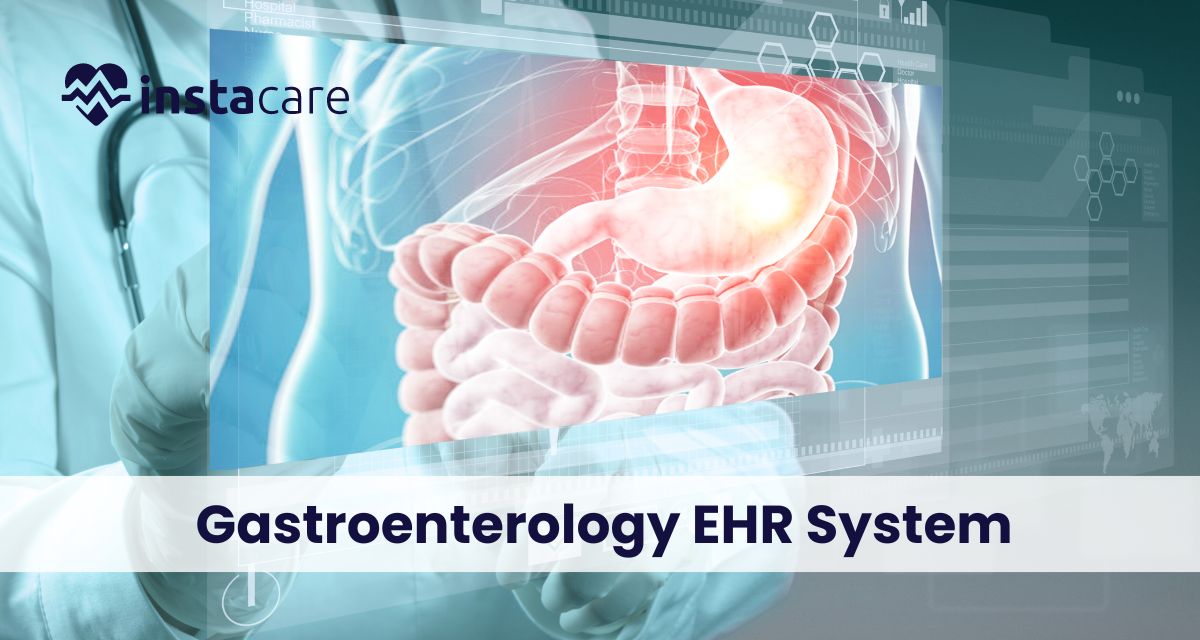Last updated on Friday, 14, June, 2024
Table of Contents
Essential Features to Look for in a Gastroenterology EHR System
Throwing light on the continuously expanding horizon of technology, it has become imperative to define the best Electronic Health Record (EHR) for your gastroenterology practice. Unfortunately, with the current trends, many choices are available and it can be quite deceiving to know what aspects of the program are fundamental. Here is a guide to the features where one needs to focus to sort out the overwhelming options and determine which specific gastroenterology EHR system components are most effective.
Seamless Integration with Practice Workflow Gastroenterology EHR System
It indicates that the best gastroenterology EHR System for your practice this year should work well within practice’s existing environment without adding complexity or inefficiency. Choose the system with aspects like easy scheduling, patient charting, clear billing, and effective reporting features. LIMS compatibility with other systems, for instance, laboratory connectors and imaging equipment guarantees the automation of data transfers and minimizes the possibility of human error.
Comprehensive Endoscopy Documentation
Review of endoscopy records is paramount to any gastroenterologist in practice. Ideally, any EHR system should incorporate detailed templates for different forms of endoscopic examinations: colonoscopies, sigmoidoscopies, and upper endoscopies. These should cover basic information like the findings on a procedure, biopsy report, and recommendations for the next course of action. Moreover, the photographic competence of capturing images and videos into the patient’s record provides better documentation and helps to share the information efficiently with care team members.
Customizable Templates and Note-taking Tools
It is, therefore, necessary for professional to ensure they develop personalized documentation to capture the unique experiences with patients in GI practice. There should be the possibility of selecting the templates and the tools for note-taking, which would be convenient for a worker. It is preferable for these templates to address a broad range of gastrointestinal disorders, surgeries, and management strategies so that the note-taking process can be streamlined without compromising the incision’s precision.
Built-in Decision Support and Alerts
Implementing clinical decision support tools can have pervasive importance in the process of improving patient safety and patient care in practice of gastroenterology. An enhanced EHR design should have clinical decision support mechanisms like medication interaction check, Allergy check, Preventative care check etc. These alerts are used in real time during patient care and enhance a healthcare provider’s decision-making process, thus reducing the likelihood to make mistakes. Furthermore, decision support tools may help clinicians to reduce the deficits in their knowledge and practice in accordance with the guidelines and best practices, therefore enhancing the quality of the care provided to patients.
Secure Communication With Organize and Embed Telemedicine
ESP functionality for secure communication and telemedicine are critical features that are required within a modern gastroenterology EHR system in the digital era. To select from EHR vendors, search for such characteristics as the capacity to support safe healthcare provider and patient communication as well as provide demanding access in reference to the physicians they referred within the EHR. EMA provides real-time communications, coordination, and patient engagement, thus filling a gap in information sharing. Also, telemedicine is a possibility of distant communication with patient, as well as patient monitoring, which makes telemedicine a beneficial tool in healthcare with regard to the availability of health service and triumph over its limitations.
Robust Reporting and Analytics
Thus, evidence-based analytics and GI practice findings are of great importance for its enhancement and lasting effectiveness. Select an EHR system with optimal reporting features specifically designed based on the metrics of gastroenterology. It allows practices to monitor several indicators, assess the results, and determine possible future step. Whereas in the past, there may have been only basic reports static reports on procedure volumes and reimbursement important for billing and collections today’s reports offer quantifiable measures of quality, patient satisfaction, and other key indicators.
With the aid of data analytics, gastroenterology practices can identify appropriate actions that need to be taken, introduce specific changes, and assess practice activities outcomes. Further, reporting functionalities help in meeting requirements of legal regulations and engaging in quality reporting initiatives, which in turn, improve practice workflows, patient results, satisfaction, and overall care.
Scalability and Interoperability
As the gastroenterology practices become more practice entities and expanding, issues of scale and integration emerge as key factors to consider on EHR systems. Select a large-scale system that will capable of being expanded as the practice grows, the volume of patients increases or as further specialty services are added or new legislation/regulations are enacted.
Generally, scalable EHR systems enable smooth expansion to allow an organization to expand capacity without incurring a loss of capability or data quality to ensure adequate care for the growing patient population and optimized function. Besides, it should also focus on interconnectivity features that help the exchange of data with other health institutions and other third parties. Interoperability of EHR systems proactively support care coordination, directly and effectively foster communication among the care teams, and engage the patients.
Responsive Customer Support and Training
Another aspect is that organizations need to invest in high-quality customer support, as well as provide comprehensive training for EHR to enhance its utilization in gastroenterology practices. A dependable vendor should provide customers with exceptional support through rapid replies to inquiries, updates, complaints, and technical problems. This way, the practice can limit interruptions during its operations while the customers are encouraged to give positive feedback. Moreover, when selecting these EHR vendors, it is prudent to opt for vendors who have well-developed training programs that meet the requirements of your practice.
Conclusion
Finally, it cannot be over-stressed that choosing an ideal EHR system is critical for the success of every gastroenterologist practice. With smart choices such as integration, documentation, decision making tools, serving telemedicine, reporting mechanism, scalability, and customer relation service, the clinical outcomes, operation ability and patient’s satisfaction will be attained. Always given enough time to compare and analyze various EHR systems to identify how best you can meet the needs of you and your practice.
FAQs
Q: How do I ensure that the EHR system integrates seamlessly with my current practice workflow?
A: Before adopting an EHR system, ask if the system will work with your existing practice management software, laboratory interfaces, and other systems that may be in place. Always request a demonstration to understand how the EHR system may facilitate some of your most common tasks, such as patient scheduling, charting, and billing. If the system is in place at other providers’ places of work, ask them about its integration and usability.
Q: Are there any templates for documenting common GI procedures and conditions?
A: Definitely, a good EHR system will come with specialty-specific, customizable templates for a gastro practice, such as templates for such procedures as colonoscopies, sigmoidoscopies, and upper endoscopies. The templates must support all necessary fields or questions pertinent to the finding, biopsy results, and treatment recommendations for a specific procedure. Ensure that the templates meet the necessary documentation and efficiency requirements in your practice workflow before implementing it in your practice.
Q: Will the system allow Gastroenterology telemedicine consultations?
A: Many modern EHR systems come with the capability to include telemedicine applications, allowing for virtual consultations with gastroenterology patients. Just make sure the platform offers this functionality and that it specifically includes the ability for secure video consultations, electronic prescribing, and remote access to patient records. In addition, check whether there are additional HIPAA-compliance functions available to enhance patient privacy in the course of telemedicine visits.
Q: How does the system assist in gastroenterology regulatory compliance and quality improvement in reporting?
A: Capability in reporting and analytics in an advanced EHR system should help in maintaining key performance indicators, clinical results, and patient satisfaction data, all required for regulatory submission, as well as for quality improvement. Also, it is crucial to ensure that the EHR vendor will provide system updates mainly with evolving standards or higher-level requirements.



